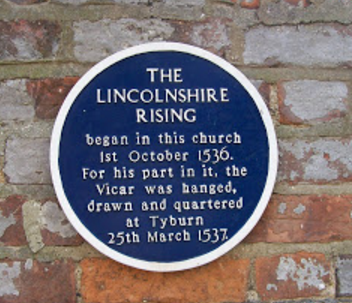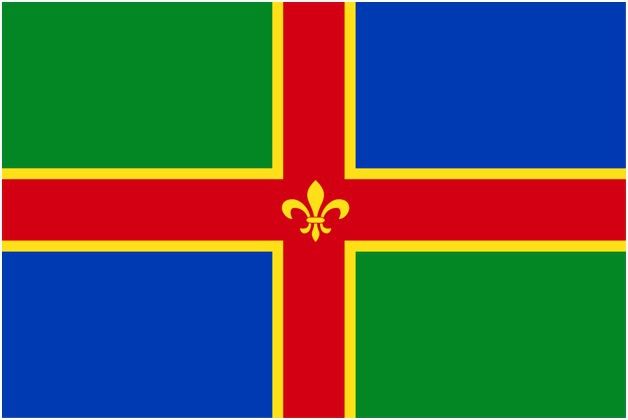
1536 – Start of the Lincolnshire Rising, the beginning of the Pilgrimage of Grace. It was sparked off by a sermon at evensong on the 1st October at St James’s Church, Louth.
As the plaque above explains, the Vicar was hanged, drawn and quartered in London, at Tyburn.
St James's church spire can be seen towering over the town and the church was at the forefront of the Lincolnshire Uprising in 1536.
Henry VIII had decided that the monasteries were too rich and powerful and decided to dissolve them and confiscate all their property. The dissolution of Louth Park Abbey was the catalyst for action. The people of Louth were fiercely against this and the Uprising began when the Vicar, Thomas Kendall, preached a rousing sermon.
“The first rising occurred at Louth on October 2, 1536, when the registrar arrived from the bishop to carry out the visitation; the commons, led by a shoemaker named Nicholas Melton – soon to be famed as Captain Cobbler – seized the registrar, burned his papers and forced the registrar and assembled priests to swear an oath to be true to the rebels and their cause.
They then marched to Legbourne nunnery and took captive the royal commissioners who were at work there.” Legbourne nunnery had been formally suppressed a few weeks earlier.
30,000 people marched on Lincoln to meet Henry's commissioners, but were stopped by Henry's men.
On the 19th October 1536, Henry VIII got tough on the Pilgrimage of Grace rebels. In a letter to Charles Brandon, Duke of Suffolk, Henry wrote: “You are to use all dexterity in getting the harness and weapons of the said rebels brought in to Lincoln or other sure places, and cause all the boats on the Humber or means of passage into Yorkshire to be taken up.
After this, if it appear to you by due proof that the rebels have since their retires from Lincoln attempted any new rebellion, you shall, with your forces run upon them and with all extremity ‘destroy, burn, and kill man, woman, and child the terrible example of all others, and specially the town of Louth because to this rebellion took his beginning in the same.’ We have sent you this day a good sum of money, and will send more as required.
However, this uprising led to the Pilgrimage of Grace the following year, again quashed by Henry's men, and the leaders were brutally killed despite Henry promising leniency.
In a letter rebuffing the Louth petition, Henry described Lincolnshire as "the most brute and beastly shire of the whole realm".
